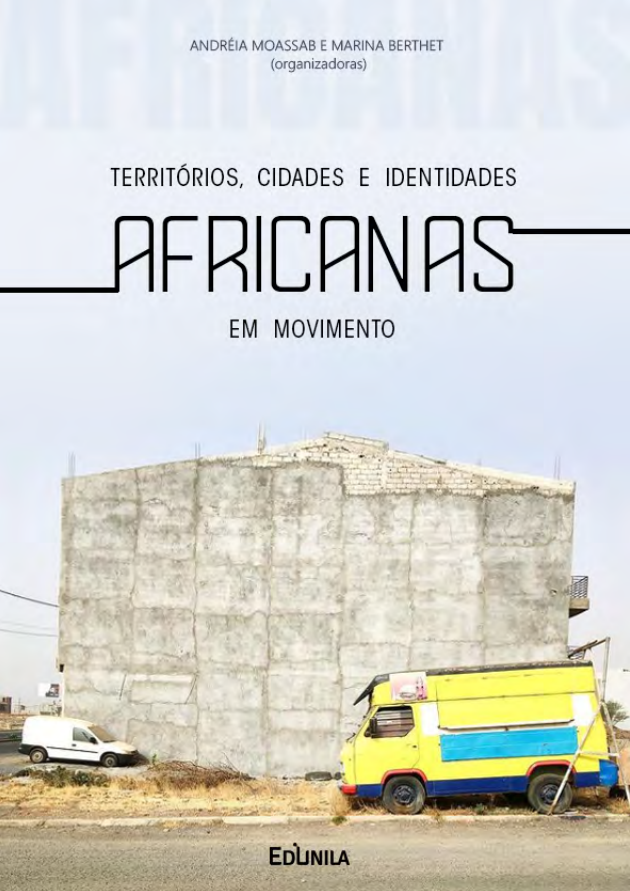Odair Barros-Varela and Redy Wilson Lima, CEsA researchers, publish articles in the book “Territórios, cidades e identidades africanas em movimento” (ed. EDUNILA)

CEsA researchers Odair Barros-Varela and Redy Wilson Lima have published the research articles “África, o berço da modernidade: por uma visão pós-colonial da modernidade e do território” and “Hip-hop em Cabo Verde: rap e representação do espaço público na cidade da Praia”, respectively. The articles contitute the chapters 1 and 6 of the book “Territórios, cidades e identidades africanas em movimento”, organized by Andréia Moassab and Marina Berthet (publisher: EDUNILA).
Click on the following links to access the pages of each article in the Repository of the University of Lisbon:
África, o berço da modernidade: por uma visão pós-colonial da modernidade e do território – https://www.repository.utl.pt/handle/10400.5/27650
Hip-hop em Cabo Verde: rap e representação do espaço público na cidade da Praia – https://www.repository.utl.pt/handle/10400.5/27651
Read the abstracts:
África, o berço da modernidade: por uma visão pós-colonial da modernidade e do território
It is necessary to take a brief look at what is conventionally called modernity and what constitutes the substratum on which the “West” anchors itself for a triumphant and universalist autonarrative. Various authors, mainly from the mid-eighties onwards, have sought to demystify the origins of Western civilisation and modernity, most notably the three volumes of Black Athena: The Afroasiatic Roots of Classical Civilization (1987/1991/2006), by Martin Gardiner Bernal.2 Other authors have followed in Bernal’s footsteps to some extent, one of them being the philosopher and historian Enrique Dussel with his work Política de La Liberación: Historia Mundial y Crítica [Liberation Policy: World History and Critique] (2007): World History and Critique] (2007), in which, situated in the field of postcolonial theory, he argues that Hellenocentrism is the father of Eurocentrism and that, given that the so-called “Greek miracle” by the German Romantics of the eighteenth century does not exist, this means having to start “anew” the history of political philosophy. To this end, he considers it essential to redefine the beginning of modernity. It is worth pointing out that it is “postmodernity” – called the historical period that seeks to overcome, or surpasses, modernity – that will give rise, in Western academia and its satellites, not only to a debate about the “postmodern condition” – or about its being the “cultural logic of late capitalism” – but also about the “vision” of modernity itself. Although many prefer expressions other than “postmodern”, or change their preference -such as Zygmunt Bauman, who starts talking about “liquid modernity”, or Gilles Lipovetsky, who prefers the term “hypermodernity”, or others who talk about “incomplete modernity”, or “late modernity” or “alternative modernities”-, in essence they do not put the emphasis on a critical analysis of the hegemonic Anglo-Saxon periodisation of modernity.
Hip-hop em Cabo Verde: rap e representação do espaço público na cidade da Praia
Despite the strong connection with Portugal and the existence in that country of numerous rap groups composed of Cape Verdeans or descendants of Cape Verdeans, the hip-hop produced there is practically ignored and very little consumed by young people, namely those from the periphery, to the detriment of the North American black ghetto culture, known through the audiovisual flows of the digital era. Young people all over the world are seen as a risk factor, an association that is particularly patent in the modern discourse on security, especially in an era in which a part of young people associate themselves with street gangs, revealing “the failure of the expected reproduction of the support mechanisms of an expansive and optimistic capitalism”, which provides the so-called “Welfare State”. Thus, in the face of a feeling of juvenile unease, evidenced in some actions that destabilize the social order and the “Creole morabeza”, it becomes mandatory that the institutions that protect this population layer control them, reprogramming them institutionally, thus building a State Social Service.
Author: CEsA Communication (comunicacao@cesa.iseg.ulisboa.pt)
Image: EDUNILA/Reproduction





